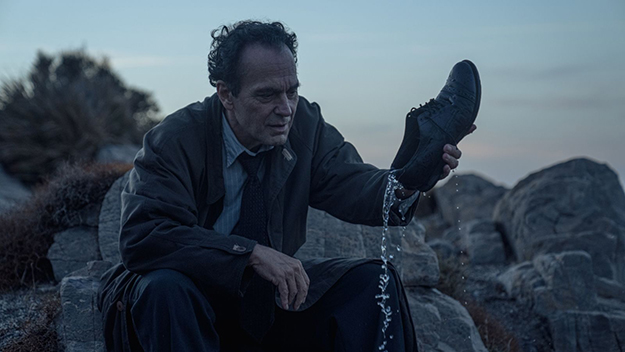Just Out of Grasp
This article appeared in the October 10, 2023 edition of The Film Comment Letter, our free weekly newsletter featuring original film criticism and writing. Sign up for the Letter here. Read and listen to all of our coverage NYFF61 here.

Close Your Eyes (Víctor Erice, 2023)
Víctor Erice’s fourth solo feature arrives a full 50 years after his exquisite, endlessly mysterious feature debut, The Spirit of the Beehive (1973)—yet the musty opulence and archaic rhetoric of the opening sequence of his new film, Close Your Eyes, feel far more antiquated. An elderly, fabulously wealthy refugee from Franco’s Spain, now living in the French countryside with his sagacious and devoted Chinese butler, engages a compatriot to seek out his long-lost daughter for the purpose of beholding her gaze one final time. It comes as something of a relief when this quaint setup is revealed to be a film within the film, the only surviving reel from The Farewell Gaze, the first feature by director Miguel Garay (Manolo Soro). Miguel was forced to scuttle the project back in 1990, when its star, Miguel’s old friend Julio Arenas (José Coronado), vanished during production. Arenas is Spanish for sands, and indeed, Julio emerges as a figure who forever seems to be slipping from someone’s grasp.
The present tense of Close Your Eyes is 2012, when a pop-documentary television program that investigates cold cases enlists Miguel for an episode regarding the still-missing Julio. In the decades since his aborted debut, Miguel abandoned filmmaking altogether to become a writer, and then abandoned writing to become a translator of books about film. The program prompts Miguel to disrupt his otherwise quiet life, and, like Julio’s character in The Farewell Gaze, become an amateur detective. He tracks down his old friend and editor Max (Mario Pardo), now a celluloid archivist; Julio’s daughter, Ana (Ana Torrent), now a tour guide at the Prado; and Lola (Soledad Villamil), an old flame from Buenos Aires who once drew the ardor of both Miguel and Julio.
These encounters with figures from Miguel and Julio’s shared past are rife with varying ratios of tenderness, camaraderie, and melancholy, yet they yield few significant clues as to what happened to Julio. Miguel then returns to his humble home in a trailer park near a beach, where we hear him pass evenings singing and strumming old cowboy songs—such as “My Rifle, My Pony, and Me,” from Rio Bravo (1959)—amidst a handful of amiable neighbors and a dog. It was at this point, during this nearly three-hour film’s drift between the plottier first third and the burgeoning catharsis of the final third, that I realized I was hooked and would follow Miguel anywhere. It had also become clear by then that Erice, now in his eighties, had forgone any attempt to revive the painterly splendor and crypto-minimalist narratives of his early films, and, working with co-scenarist Michel Gaztambide, had instead embraced a seductively meandering, novelistic approach to cinematic storytelling entirely new to his oeuvre. Close Your Eyes is a heartfelt homage to cinema’s singular relationship to memory, but it is also Erice’s most literary film: if Miguel’s The Farewell Gaze seems to resemble a Jorge Luis Borges story, the framing film, with its emphasis on disappearances, stories within stories, and amnesia, echoes the novels of Paul Auster.
Yet callbacks to various elements in Erice’s small but haunting body of work abound in Close Your Eyes—the title itself is a reference to a pivotal scene in El sur (1983), when a father hypnotizes his daughter, instructing her: “Close your eyes and let your mind go blank.” Enigmatic patriarchs are key figures in The Spirit of the Beehive, El sur, and Close Your Eyes, with Torrent in the role of the daughter in both the first and last of these. Each of Erice’s features, including his gorgeous nonfiction film Dream of Light (1992), are possessed of a heightened awareness of the fleetingness of all things. Figures routinely recede or disappear, just as light always seems to be surrendering to shadow. Most poignantly, Close Your Eyes ends where The Spirit of the Beehive begins, with a cinema screen becoming not only a mnemonic device, but also a site of psychic transformation.
Cinemas are also surveyed as houses of collective memory in Kleber Mendonça Filho’s idiosyncratic follow-up to his contentious psychotronic thriller Bacarau (2019). Pictures of Ghosts is a playful, freewheeling personal essay on time and architecture, as well as a love letter to Recife—Brazil’s fourth-largest city, and the memorable setting of Mendonça’s fiction films Neighboring Sounds (2012) and Aquarius (2016). Both of those features are repeatedly referenced in Pictures of Ghosts, which also brims with eye-catching archival materials, home movies, and movies made at home: Mendonça was a precocious teen auteur, and he uses this project to draw upon a robust catalogue of nascent forays into filmmaking. This rigorously associative work muses on a range of personal and historical memories—Mendonça’s mother’s penchant for home renovation, the era in which the Nazis set up film offices in Recife, the pomp surrounding civic visits from Janet Leigh and Tony Curtis, a veteran projectionist’s memories of the days when certain “art films” would be screened with narrators to explain the action—all of which culminates in a whimsical encounter between Mendonça and a Herb Alpert–loving cabbie with an appropriately cinematic superpower.
For all of Pictures of Ghosts’s thematic detours, it gradually becomes clear that its heart lies firmly in the movie house. There is a silly but enjoyable meditation on messages hidden on marquees, and Mendonça examines his hometown’s architectural and cultural history to chart the repurposing of churches into cinemas and back into churches again, underlining how each institution serves a similar desire for shared spectacle and spiritual communion. “Over the years,” Mendonça says in his running voiceover, “I learned how time changes places.” This statement could easily be reversed, given how Pictures of Ghosts is infused with evidence of how collective moviegoing erases our sense of temporal order by presenting us with an ever-accumulating, ever-lengthening cosmology of sounds and images, voices and faces—glamorous phantoms whose hold on our imagination turns them into constellations in a seemingly infinite dreamworld.
José Teodoro is a critic, multidisciplinary artist, and co-founder of the band Applied Silence.







